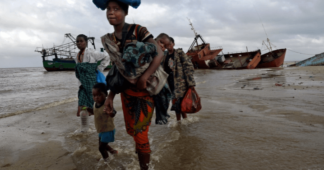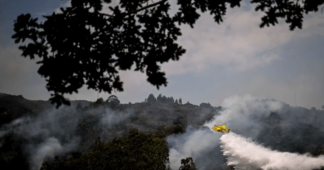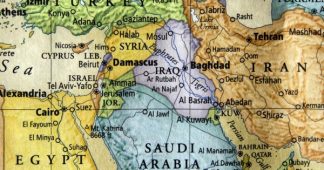As climate policy is weakened, extreme weather intensifies and more refugees are driven from their homes – and the cycle of hatred continues
By George Monbiot
Jun 15, 2023
Round the cycle turns. As millions are driven from their homes by climate disasters, the extreme right exploits their misery to extend its reach. As the extreme right gains power, climate programmes are shut down, heating accelerates and more people are driven from their homes. If we don’t break this cycle soon, it will become the dominant story of our times.
A recent paper in the scientific journal Nature identifies the “human climate niche”: the range of temperatures and rainfall within which human societies thrive. We have clustered in the parts of the world with a climate that supports our flourishing, but in many of these places the niche is shrinking. Already, around 600 million people have been stranded in inhospitable conditions by global heating. Current global policies are likely to result in about 2.7C of heating by 2100. On this trajectory, some 2 billion people may be left outside the niche by 2030, and 3.7 billion by 2090. If governments limited heating to their agreed goal of 1.5C, the numbers exposed to extreme heat would be reduced fivefold. But if they abandon their climate policies, this would lead to around 4.4C of heating. In this case, by the end of the century around 5.3 billion people would face conditions that ranged from dangerous to impossible.
These conditions include extreme disruption, morbidity and death through heat-shock, water stress, crop failure and the spread of infectious disease. The figures do not take into account the effect of rising sea levels, which could displace hundreds of millions more.
Already, weather stations in the Persian Gulf have recorded wetbulb measurements – a combination of heat and humidity – beyond the point (35C at 100% humidity) at which most human beings can survive. At other stations, on the shores of the Red Sea, the Gulf of Oman, the Gulf of Mexico, the Gulf of California and the western side of south Asia, measurements have come close. In large parts of Africa there is almost no monitoring of extreme heat events. People are likely to have been dying of heat stress in high numbers already, but their cause of death has not been registered.
India, Nigeria, Indonesia, the Philippines, Pakistan, Afghanistan, Papua New Guinea, Sudan, Niger, Burkina Faso, Mali and central America face extreme risk. Weather events such as massive floods and intensified cyclones and hurricanes will keep hammering countries such as Mozambique, Zimbabwe, Haiti and Myanmar. Many people will have to move or die.
In the rich world we still have choices: we can greatly limit the damage caused by environmental breakdown, for which our nations and citizens are primarily responsible. But these choices are being deliberately and systematically shut down. Culture war entrepreneurs, often funded by billionaires and commercial enterprises, cast even the most innocent attempts to reduce our impacts as a conspiracy to curtail our freedoms. Everything becomes contested: low-traffic neighbourhoods, 15-minute cities, heat pumps, even induction hobs. You cannot propose even the mildest change without a hundred professionally outraged influencers leaping up to announce: “They’re coming for your …” It’s becoming ever harder, by design, to discuss crucial issues such as SUVs, meat-eating and aviation calmly and rationally.
Continue reading at www.theguardian.com
We remind our readers that publication of articles on our site does not mean that we agree with what is written. Our policy is to publish anything which we consider of interest, so as to assist our readers in forming their opinions. Sometimes we even publish articles with which we totally disagree, since we believe it is important for our readers to be informed on as wide a spectrum of views as possible.











